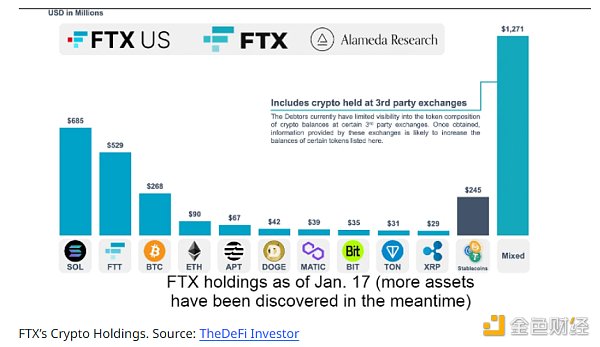How to establish a compliant cryptocurrency exchange after Coinbase’s lawsuit
Establishing a compliant cryptocurrency exchange after Coinbase's lawsuit.I have gained a reputation as a skeptic on the legality of selling cryptocurrency tokens in the United States. I did a lot of writing on the subject, especially when I was pursuing my law degree in 2017, giving me more free time and freedom to express what I wanted to say.
Moreover, I held this position when it was not popular and very obvious, unlike the recent batch of cryptocurrency critics such as former government attorney John Reed Stark (who seems to take endless pleasure in trampling on it in times of industry distress). For example, on July 9, 2014, my friend Tim Swanson and I were quoted in a CoinTelegraph article titled “Legal Risk Mitigation for Securities Issued on the Cryptographic Ledger,” at which point I said, “Almost nobody is doing it right. To date, I have not seen a cryptosecurity structured properly.”
At that time, people thought I was crazy, and others may have thought I was just a jerk; the truth may have been somewhere in between. Of course, it’s worth remembering that in 2014, the idea of an “initial coin offering” (ICO) did not exist; entrepreneurs like Joel Dietz marketed his “Swarm” crowdfunding tokens as “cryptostocks,” a term that was not popular throughout the crypto industry, and a month after my article was quoted by CoinTelegraph, Ethereum launched its ICO, but it wasn’t called an ICO at the time either. Referred to as “cryptocurrency Gas for sale on the Ethereum network” by Joe Lubin’s lawyer, or as a security, as the New York State Attorney General recently claimed in a suit against KuCoin.
Then in 2017, Ethereum exploded, bringing with it thousands of imitators and similar projects, and US regulators were slow to react. At the time, SEC director Bill Hinman proposed (now discredited) exceptions to the Howey test for “sufficient decentralization” in his famous “Hinman speech,” fueling the ICO fire. Remember, Hinman was in San Francisco, and those of us who are not cool venture capitalists in San Francisco generally believe that they successfully persuaded that office that Ethereum was a hot investment – the next internet – and the best thing the government could do was get out of the way and let Ethereum prove it.
- Founder of Synthetix: Many design decisions are unavoidable choices, and forward-looking planning is almost impossible.
- Protecting Investors? A Detailed Explanation of the SEC’s Lawsuit Against Binance
- Shapella in the Rearview Mirror: What’s Next for Ethereum After Major Upgrade?
It is safe to say that Ethereum has not solved many of the scalability issues it needs to become the next internet in five years. Given these broken promises, it may not be surprising that governments have decided to restore the status quo (cracking down on the cryptocurrency industry), as evidenced by the New York State Attorney General’s lawsuit against KuCoin.
Chaotic and Strange Settlements
The situation following Hinman’s speech can only be described as chaotic. Prior to Hinman’s speech, the SEC had really only stepped into the cryptocurrency business in obvious and notorious fraud cases. The first such case I can recall was the SEC’s case against Trendon Shavers and Bitcoin Savings and Trust (a Ponzi scheme), as well as the SEC’s case against GAW Miners, Joshua Homero Garza, and others (another Ponzi scheme involving the sale of “mining contracts” and a $20 stablecoin called “Blockingycoin”).
In terms of non-fraud enforcement, the U.S. Securities and Exchange Commission began taking its first enforcement actions in late 2018, announcing settlements involving some token-related projects only a few months after Hinman’s speech. On November 8, 2018, the first such settlement was reached with the founder of the early decentralized exchange (DEX) EtherDelta; the SEC claimed that DEX was an unregistered exchange, which necessarily meant the SEC considered some assets (i.e., ether and ERC-20s) on EtherDelta to be securities. Ten days later, the SEC announced its first settlements with two originally unremarkable ICO issues, Airfox and Blockingragon; both interviewees agreed to register their tokens as securities (which, to my knowledge, did not seem to happen).
Over the next year, a series of strange settlements emerged, which failed to stop further ICO issuance, which occurred alongside a batch of strange trades attempting to comply with the non-binding guidance Hinman issued. For example, EOS, which advertised its product on a giant billboard in Times Square during Consensus 2017 and raised over $4 billion in cryptocurrency (valued at the time), was allowed to pass for just a $24 million fine – with no registration requirement!
Other projects have not been so lucky, such as Kik Interactive, Telegram, and Ripple Labs, which all launched massive ICOs; Kik and Telegram lost badly in federal court, and I don’t like Ripple’s chances. Similarly, the much smaller LBRY project, based in New Hampshire, which predates EOS by several years, as far as I know, has not been offered a settlement by the SEC, which would allow them to continue their business; the only reasonable conclusion I can draw is that the SEC’s Boston office wanted a scalp, and there are only so many crypto startups you can find in New England, let alone New Hampshire.
No surprises
This brings us to the SEC’s charges against Coinbase, which shouldn’t surprise anyone who’s been practicing law in the US since 2018.
The charges are numerous; the SEC accuses Coinbase of violating registration requirements under the Securities Act of 1933, related to its custody of proof-of-stake securities.
The SEC also accuses Coinbase of violating registration requirements under the Exchange Act, which requires anyone engaging in securities transactions to register and be subject to oversight by the Commission. In addition, Coinbase is also accused of operating as an unregistered securities broker-dealer and unregistered clearing agency, the latter of which is “any person who acts as an intermediary in connection with any transaction in securities…involving payment or delivery, or both, using any facility of a national securities exchange…or providing facilities for comparison of data respecting securities transactions.”
I’m not going to bore you with the tedious broker-dealer/exchange registration requirements. Nor am I going to do a detailed Howey analysis of the many tokens mentioned in the complaint (including Solana, ADA, Matic, Filecoin, SAND, AXS, CHZ, FLOW, ICP, NEAR, VGX, DASH, and NEXO). The important thing here is that the SEC is seeking, as a remedy, a permanent injunction against Coinbase’s operation of an unlicensed exchange. If they can rope in one of those tokens and win a victory in court, they could potentially shut down Coinbase’s core business altogether.
What surprises me is that it’s taken this long for this to happen. Back in 2017, I assumed that one day an event would occur — I referred to it as a “dawn raid that occurs simultaneously on major exchanges and major ICO promoters, with various agencies coordinating their activities across various nations.” It’s hard to tell if we’re at the beginning of that process, but if the SEC is going after Coinbase, nobody in Coinbase’s business is safe. I called that event “Zombie Groundhog Day” (a sudden large-scale law enforcement crackdown that would inflict serious harm on cryptocurrencies), and while it’s extremely bearish for the cryptocurrency market, I think it’s safe to say that it’s here now.
What should we do now?
What’s next? Cryptocurrencies won’t disappear, so I think the answer is “new exchanges that won’t carry all this regulatory burden.” In the possible form, this is my current thinking:
-
Paradoxically, there may be no better time than today, except for 2012, to launch a cryptocurrency exchange. For the first time since Bitcoin was born, compliance costs will be lower than non-compliance costs. Existing industry giants have a lot of legal, technical, and debt to resolve, which will distract them and require a lot of capital.
-
Cryptocurrencies will not disappear, and the fastest growing places – especially Latin America and Africa – have neither the political will nor the coordinated enforcement power to shut them down.
-
Let companies like Coinbase view crypto tokens as old-fashioned securities, just as they try to manage Starlink like we manage road traffic. Similarly, expecting the US government to simply make cryptocurrency happen is unrealistic. US cryptocurrency giants are stepping up lobbying efforts and taking an open-minded approach to compromise, and will find a middle way in the United States, standardizing cryptocurrency business at the latest within the next five years.
-
Successful companies will have a growth strategy that does not include the United States, and then need to be prepared to enter the United States immediately once regulations are favorable – or, alternatively, they need to develop a subsidiary like INX that operates and obtains appropriate regulatory approval. I suspect that the final regulations will be relaxed so that companies like INX can operate as Coinbase and Gemini do today. In order to achieve scale, startups need to establish footholds in countries that do not prohibit ICOs and allow exchanges to conduct instant cryptocurrency transactions, without treating them as broker-dealers or clearinghouses.
-
The only G20 country that I can think of that meets these criteria is the UK. The UK should be used as a starting point to enter English-speaking Africa and India, while the United States needs to pick up and (likely) replace the president instead of completely blocking capital from flowing to the cryptocurrency market.
We will continue to update Blocking; if you have any questions or suggestions, please contact us!
Was this article helpful?
93 out of 132 found this helpful
Related articles
- Thunes, a digital payment infrastructure platform, has completed a $60 million Series C funding round with Marshall Wace leading the investment.
- Summary of Uniswap V3 asset management, earnings, and structured product protocols
- Exploring the Scalability of Single-Chain Architectures: A Case Study of the Solana Validator Client Firedancer
- End of L1 Battle Marks the Start of a New Era for L2 Subdivision
- SEC strikes heavily and big Vs can’t sit still
- Interpreting the data on the current state of USDT: Market capitalization has increased by over 25% this year, but active users have significantly decreased.
- Overview of House Hearing: SEC Enforcement Actions Criticized, Cryptocurrency Regulations May Take Years






